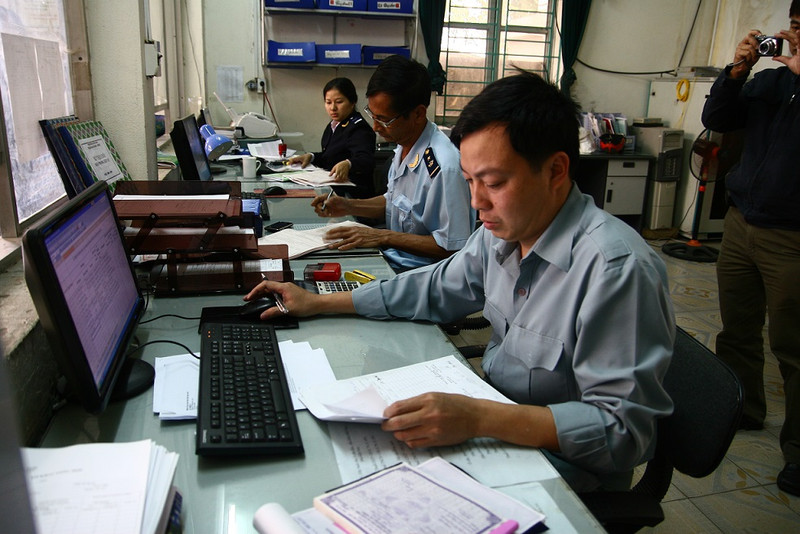On July 13, Prime Minister Pham Minh Chinh issued a telegram to ministries, agencies, and localities nationwide, asking them to urgently implement further administrative reform in service of the public and enterprises.
PM Chinh ordered them to “publicise in a timely, sufficient, and accurate manner, administrative procedures on the National Database on Administrative Procedures so that cadres, public servants, the public, and businesses can know, implement, and supervise the implementation.”
Every month, procedures that are newly issued, amended, supplemented or annulled, must be made clear in full statistics to ensure close control over the enactment and implementation of the procedures.
At a recent government cabinet meeting on Vietnam’s socioeconomic performance, Prime Minister Pham Minh Chinh underlined that the government will improve the quality of reformation of the portfolio of conditional investment and business professions and business conditions. It will also review and revise conditional business professions and remove from the portfolio the professions that can be applied to other more effective management solutions.
“We will also revise and remove business conditions currently stipulated in specialised laws if such conditions are found illegal, unnecessary, infeasible, and unclear. In addition, the government will also review and revise all types of practising certificates to reduce their number and save costs for society,” PM Chinh stated.
The government will also unify, merge, and simplify legal documents in a manner that will be easy to understand and access, fully ensuring transparency.
“I have met with many domestic and foreign enterprises and investors, and they keep complaining about our cumbersome administrative procedures. Thus, reforming administrative procedures will continue to be among the key tasks until the year’s end, with the satisfaction of people and businesses placed at the centre of concern,” PM Chinh said. “It is ordered that all ministries and agencies boost reforms, and firstly change their mindset, methodology, and solutions.”
Key driver of economic growth
After growing 3.32% in the first quarter of 2023, the Vietnamese economy bounced back to 4.14% in the second quarter. In the first half of the year, it increased by 3.72%, lower than the year-on-year growth rate of 6.42%, in the same period last year.
“Enterprises are now facing massive difficulties, so boosting administrative reforms will help their performance become more favourable and help improve the economy’s competitiveness,” PM Chinh stated.
Nguyen Van Minh, an overseas Vietnamese living in France for 30 years, said that he wants to come back to Vietnam to establish a transport company.
“Previously I returned to Vietnam with a tourist visa that would allow me to stay in the country for only one month. However, the duration has now been increased to three months, making it favourable for me to stay in the nation longer and seek investment opportunities,” Minh said.
A few weeks ago, the National Assembly approved extending tourist e-visas from 30 to 90 days, starting from August 15, 2023. Upon being granted an e-visa, a foreigner can enter and exit an unlimited number of times within 90 days, without having to go through procedures for obtaining a new visa.
However, Minh remains afraid that his investment plan in Vietnam may not become feasible.
“I learned that in Vietnam, there are still many obstacles in business and investment conditions. For example, the current regulations on fire prevention and fighting are making it hard for enterprises to abide by,” Lien said. “If a logistic firm invested about 200,000 USD into building a warehouse, it is required to invest in an anti-fire system worth about 42,000 USD, meaning 21% of the investment capital – quite a big sum.”
According to Nguyen Minh Thao, head of the Central Institute for Economic Management’s Department for Business Environment and Competitiveness, this legal requirement is too strict.
“Some enterprise’s investment into warehouses cannot spend much money installing such a costly anti-fire system. Then they have to find ways to pretendedly meet anti-fire conditions,” Thao said.
According to business associations in Vietnam, although the government has made great efforts to reduce and simplify many administrative procedures, many regulations are still vexing businesses, investors, and individuals. In many localities and ministries, when regulation is removed, another more complicated one is created, making it more difficult for enterprises to perform.
Under the latest Business Climate Index (BCI) report released last week by the European Chamber of Commerce in Vietnam (EuroCham), Vietnam continues to attract foreign investors, with 48% of respondents expecting an increase in their company’s foreign direct investment (FDI), in the country next quarter. However, a total of 40% of businesses express no plans for elevated FDI, marking a 4% increase from the previous BCI. Nevertheless, Vietnam remains firmly positioned among the top five investment destinations for over one-third of businesses, underscoring its enduring appeal.
Despite this, EuroCham also pinpointed barriers to their investment in Vietnam. Respondents highlighted the importance of improving the regulatory environment, developing infrastructure, and ensuring access to financing, to enhance Vietnam’s attractiveness for FDI. The report also emphasises that unclear regulations and onerous administrative procedures are the primary barriers hindering FDI, with 53 and 50% of businesses, respectively, citing them as the most significant regulatory obstacles impeding their operations in the country.
European firms are also facing challenges with visas and work permits for foreign workers. “Securing visas and work permits for foreign workers continues to pose persistent challenges, with over 80% of surveyed businesses encountering various difficulties,” the report said. “The prolonged processing time for obtaining visas and work permits emerges as the most pressing issue.”
Additionally, nearly half of the surveyed companies struggle with justifying the hiring of foreign workers, hindering knowledge transfer to Vietnamese personnel in three-quarters of the companies surveyed.
Expectations
Adam Sitkoff, executive director of the American Chamber of Commerce in Hanoi, said, “We believe the most important factor for a favourable investment climate is a fair, predictable, and streamlined regulatory environment, that values innovation - not only to attract new investment but also to maintain and grow the investment already here.
“Facilitating prompt approvals of business licenses and investments - including unfreezing real estate development - is key. Greater use of e-government and e-approvals would also be a big step forward. There is no doubt that existing investors expanding operations is the best advertisement to attract new investment,” Sitkoff said.
According to him, American companies and investors support efforts to create a modern economy that will attract future investment and high-paying jobs for Vietnamese people.
“For Vietnam to be successful, non-productive red tape must be controlled and the country’s regulatory framework must be stable and predictable. AmCham members remain concerned with changes in policy and regulations, which are not consistent with international best practices – frequently seen in the digital economy space, for example,” Sitkoff said.
Senior economist Raymon Mallon, who has been working and living in Vietnam for over 20 years – with a profound analysis of the country’s economic situation, also said that to make individuals, investors, and businesses perform more effectively, the Vietnamese government would need to take more drastic actions.
He pointed out some barriers that must be removed as soon as possible.
For example, he said that stronger regulators that are independent of commercial interests are needed to enforce competition policy, to ensure standards (for example for health, education, and safety), and to oversee network industries (transport, power, and communications).
A report released by the Government Office last week showed that since 2021, about 2,230 business-related procedures have been cut, reduced, and simplified. However, so many regulations have yet to be removed and simplified. Specifically, 714 out of 1,416 regulations that have been approved for being cut, have yet to be implemented due to the irresponsibility of many units and agencies.
This year, PM Chinh said, the government will continue studying, amending, and supplementing regulations on specialised inspection of export-import goods, in which there will be a reduction in the goods portfolios, while fully applying principles on risk management and supplementing the portfolio of items exempted from specialised inspection. Imported items in small volumes for internal use, especially those that have been highly standardised, will be exempted from specialised inspection.
















